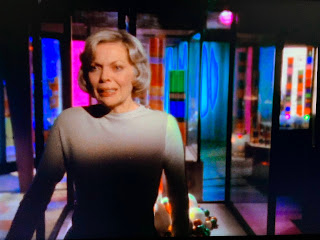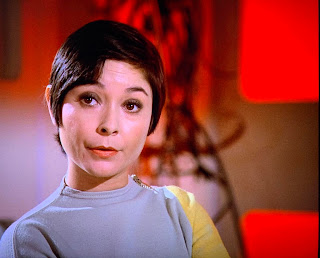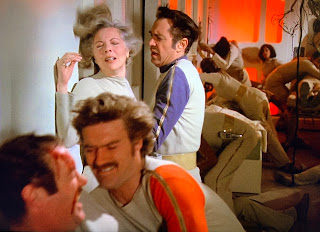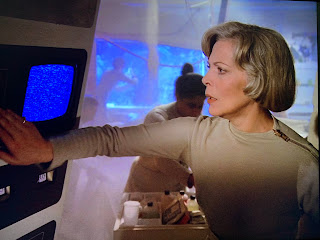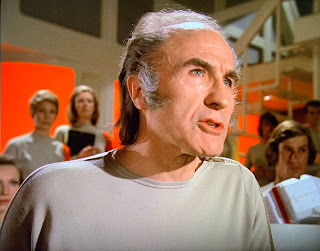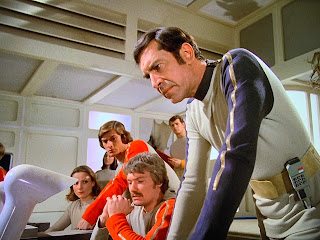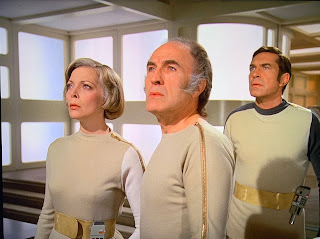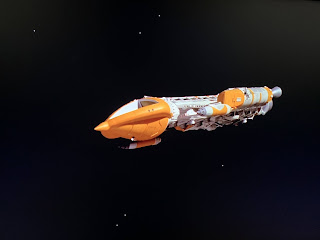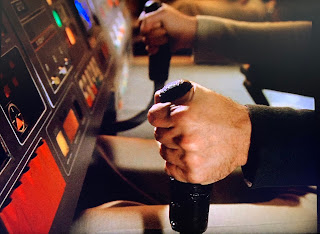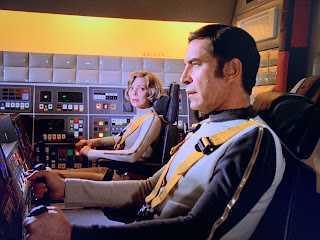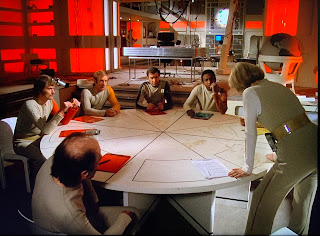2020. No words.

Like the snowman in Rudolph The Red-Nosed Reindeer, "tell me when it's over." Short of war this has been a nightmare of epic proportions if ever there was one, globally, nationally, personally, but it could always be worse. It could be right? We have to tell that to ourselves. Plus, we need to find the bright spots in this often dismal year.
Sadly, this writer has not been overly motivated to write and deep dive on science fiction of late. I wish the inspiration was there, but, alas, the proof is in the proverbial pudding here at Musings Of A Sci-Fi Fanatic as you can see by the general infrequency of posting. Perhaps this virus-related mask wearing, social distancing, rioting, thieving, burning, destruction, defunding, deep political divide and general lack of kindness has me worn down.

My Blu-Ray player, as the situation has called for it, has been my haven from the nightly news which is generally depressing beyond words. So with that escape in mind this sci-fi writer has enjoyed catching up on a great many TV series in 2020 (of course many of those shows are rife with political messaging---maybe there really is no escape). Here are a few short takes on what I've been viewing on that front in front of the sexy old boob tube (She Blinded Me With Science-Fiction Part I). The old girl always delivers during this pandemic and she's been in overdrive, but when isn't she?

LOST (2004-2010). It took some time to getting around to completing this series. I wrote about the outstanding Season One right here on this blog. Upon its original airing, following the series and waiting week to week for the next episode became a labor and I dropped off the show at the end of Season Four. This is not uncommon for me. With two seasons to go, it was always my intention to get back to it and finish the series. So, I went back to the beginning and watched it all beginning to end.

I'm here to attest that LOST was exceptional television, outside of being merely influential. It was a thrilling mystery ride straight through to its rather poetic conclusion. For a show without a definitive game plan or series bible from which to draw upon by all accounts, it amazed thanks to all involved. However, despite that bible, it was the fortunate recipient of strong writing, creative showrunners and magnificent casting, not to mention that glorious island backdrop. Some of the episodes were positively stellar (Flashes Before Our Eyes, The Man From Tallahassee, Expose, Left Behind, The Man Behind The Curtain and Through The Looking Glass may be some of my favorites from Season Three as an example), but none were really ever less than very good to excellent. To pinpoint and name just a few would actually be a disservice to how outstanding this show is as a whole. I'm pleased to see the series was given such a fitting conclusion. ABC smartly signed on a winner and despite its creative limitations enforced by network television still managed to be dramatically enthralling without the no holds barred graphic content and freedom other shows have since enjoyed on other channels. Experiencing it today it still holds up. LOST is simply filled, palm tree to palm tree, shore to shore, with so much dramatic and story subtext it is a relentlessly engaging tale nailed and sold by killer performances and great direction.
Additionally, and I'm not offering anything that hasn't perhaps been written about before, but aside the series being set upon an unknown island and physically being lost, the writers assembled a cast of characters that are for all intents and purposes genuinely lost in their lives. We identify with the journey of these characters most of all, because at the end of the day aren't we all a little lost in life?
I suspect LOST will forever remain one of the very best. For the library, this is a Blu-Ray Essential!

Stargate Universe (2009-2011). SGU is the third and, to date as of this writing, final iteration of the long-running and established Stargate franchise. It's another series I was able to finally complete. In fact, an overall summation of Stargate Universe Season Two was one of my last posts here at the blog. I wasn't entirely certain what to expect from the show's second season given its untimely cancellation. Perhaps I was about to unwittingly discover what all of the problems were with the series that led to its unexpected demise despite an incredibly strong first season.
Upon completing the entire series and its nearly perfect forty (40) episodes I was able to experience for myself just how special it was, however ephemeral.
Nearly thirty years after another short-lived sci-fi conclusion in the form of Space:1999 (1975-1977), it was clear SGU echoed the sense of exploration and mystery that immersed that once special series in its own distinct approach to space exploration and sci-fi storytelling. SGU was, in a sense, a kind of sister series to the Gerry Anderson classic, as much as it was a part of an established franchise, and both were cut short prematurely with so much more potential.
Nevertheless both exist, can and do endure, and in this much we can be thankful. SGU and Space:1999 (a series that still feels like appointment television when I sit down for an episode) are both worthy of discovery beyond their conclusions. Both are imbued with high quality production work and are essential for science fiction fans. Thus, both are Blu-Ray essentials!
Sadly, Season Two is on DVD only, but still essential. Season One is on Blu-Ray. Way to respect a property MGM.

Swamp Thing (2019). This is arguably the DC superhero series equivalent of the science fiction series Firefly (2002). A single season with so much promise, wonderful effects and some good storytelling is, yet again, sadly axed before it could even emerge from the swamp and find its legs with an audience. As a science fiction fan Firefly is still near perfect.
As someone not particularly drawn to the world of superheroes in TV or film, Swamp Thing's concept is worth appreciating. In film, Watchmen and perhaps Nolan's Batman series remain favorites, but outside of those if I see a comic book association (and I collected them voraciously as a kid) they are often of little to no interest.
I made an exception with the TV series Swamp Thing. Even as solid as Swamp Thing is, in all its murky details, it's still unessential viewing to this fan of collecting a great series on Blu-Ray. For fans of DC Comics' characters and DC TV drama Swamp Thing comes recommended and I believe possibly essential to those in love with the superhero culture particularly the Swamp Thing character. As positive as many reviews have been for this series, it is not a critical must watch and a generally slight and underwhelming entry.

American Gods (2017-present). Folks. Ugh. Wow. Argh! Pray to the gods this one is turned around for Season Three. After a positively mesmerizing first season experience that is one to absolutely relish, the folks in charge of the series interpretation of Neil Gaiman's comic work fall flat on their faces for Season Two. It's like a different show, because it is. What a mess!
All of the racial politics infused into this season aside, it's just not executed well on any level. I remained open-minded throughout the second season but it became an absolute slog. Often it was downright boring. One of the characters is killed and by the time you get there you don't even care. I was exhausted and just wanted the season to be over. I had read all of the negative reviews out there for the second season and I finally caved believing all those people had to have it wrong. Oh the pain. They were not wrong. Season Two started admirably and the first three episodes kept me in the series in a way reminiscent of Season One. Episode four takes it off the rails and never recovers. There has been a third season renewal. If the reviews for it are not resolutely positive like the first it will be a definitive pass. That's truly unfortunate because anyone who has seen that first season can appreciate all of its stylish direction, scriptwriting swagger and delicious performance turns from a plethora of notable faces. Even Ian McShane and Crispin Glover cannot save the old and new gods from this positive apocalypse of a season. Thankfully the brief, but painful, disappointment is for a mere eight episode sophomore season. American Gods Season Two is a hard pass. This is non-essential to the Blu-Ray library! Season One however remains essential.

Watchmen (2019). However imperfect the Zack Snyder film was it was nevertheless an immersive film experience. Snyder is constantly under assault as a filmmaker, but his Watchmen film remains a visual pleasure not unlike 300 (2006), Sucker Punch (2011) or his underrated Superman film, Man Of Steel (2013). Unrelated to Snyder, the Watchmen film was as dazzling as that first season of American Gods. I'm ignorant to the facts here regarding the source material, but by all accounts I believe the film was quite faithful to the book, while Lindelof developed a complete reinvention or reimagining of the source material. HBO, with favored scribe Damon Lindelof, took on a premiere TV interpretation of the Gaiman novel. Some have dubbed it Wokemen. Again, with open mind, this writer came out the other end of the nine (9) episode series with mixed feelings. It was as if the people involved with both this and the second season of American Gods were indeed channeling recent political movements and racial politics. I'm open to new interpretations and this result may be your thing, but it wasn't for me.

Lindelof, the man behind HBO's The Leftovers and amazing LOST episodes like Through The Looking Glass (Season 3), The Constant (Season 4) or The End (Season 6) just to name a few of the many, tackles yet another complex world with much aplomb. The atmosphere, music and performances are second to none. Regina King and Tim Blake Nelson are riveting as are Jean Smart and Jeremy Irons. There is no shortage of things to love about HBO's Watchmen. Editing, set pieces, the story, it all flows rather well as a bizarre alternate history despite its many disparate, strange and even otherworldly elements. Though, as it proceeded from a strong start into inevitable, politically-infused mind-fuck territory, the series ultimately lost me. Issues of race and the deconstruction of history through this science fiction left me wondering if the series echoed any of the material found in the Dave Gibbons work. The film was much different. I'm grateful for the differences, but one worked much better than the other for me a story of entertainment.
Lindelof is incredibly talented but, not unlike American Gods Season Two, Watchmen tackles racism within some rather strange material. This new culture war that is being stoked in real life is on display here, but rather artfully so. As a result, Watchmen is arguably more effective than American Gods' second season to be sure. The messaging today is so radically different from what I was taught as a kid it's just hard to comprehend quite frankly. But a new world it is and the creative people behind American Gods and Watchmen seem to be tapping into it and on board with it, understand it and/or want to promote it in their own creative ways.

The approach to the writing of the story over nine short episodes was very reminiscent of the sometimes impenetrable The Leftovers. This storytelling approach is becoming a Lindelof trademark, but the human component of the Watchmen was a bit lost in translation. Who did I care to watch at all and why? It was absent from the second season of American Gods. It wasn't sold to me on Watchmen either.
Once upon a time 22-24 episodes of a single season of network television seemed overly extensive. It was a miracle how strong each LOST season was given those tall story orders. With just nine episodes there's no room for filler in Watchmen, and there isn't, but these overly short seasons leave me wishing for a slightly lengthier run. Though perhaps additional material would not have helped here for me. As it is, the episodes appear to achieve the planned story however oddly alternative this world was intended to be. American Gods at just eight episodes seemed to meander and lose focus as it delved into a slavery narrative. Watchmen is much better with its focus, and while it worked sometimes even with its anti-white messaging, these alternate history narratives seemed to struggle as entertainment despite their share of high points.

Watchmen is by no means essential, while I respect the efforts made here more than I did the second season of American Gods, it just wasn't as good as the promise of those initial episodes teased and should have been much better. For those in the mood for something a bit more extraordinary and logically complex this may be a series for you. Perhaps a working knowledge of the Gibbons book would help, but this deconstructed Watchmen won't be for everyone. This is one you really need to see for yourself to determine its artistic value to your heart. I'm sad to report though, this series is non-essential viewing in my humble estimation particularly with regard to anyone looking for an emotionally resonant human component. This is often important to me. It won't have a place in my Blu-Ray library next to the more traditionally faithful film. If you want unconventional and challenging the HBO series may be worth a shot, but proceed with caution. This writer wanted to enjoy this series much more and it just never materialized.

So there you have it your watch man did some watching and clearly a lot less writing of late. But I thought I would stop and say hello and wish everyone well and continued health through this most trying year.
The bloggers and readers out there are always a pleasure to have around. I personally enjoy seeing the writers write out there so I thought I'd offer a short take here as I continue to flounder in my own personal inspiration oblivion.
I leave you with some of the wonderful images from LOST.
















































